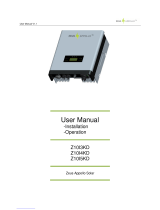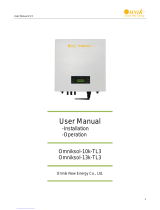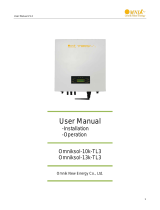
2. All plugs are only connected if they are dry and clean! Connectors are not waterproof when
unmated.
3. All work on cables and inverters must be carried out with caution!
4. Do not carry out installation work in strong winds.
5. Do not stand, step, walk and / or jump on modules under any circumstances. Localized heavy loads
may cause severe micro-cracks at cell level, which in turn may compromise module reliability and
void warranty.
6. Do not drop or place objects (such as tools) on the modules.
7. Do not lift modules by their wires or junction box, lift them by the frame.
8. Do not place excessive loads on the module or twist the module frame.
9. Do not use sharp instruments on the modules. Particular care should be taken to avoid module
back sheets being damaged by sharp objects, as scratches may directly affect product safety.
10. Do not install modules near open flames or flammable materials
11. Do not immerse modules in water or constantly expose modules to water
(Either fresh or salt) (i.e., from fountains, sea spray).
12. Exposing modules to salt (i.e., marine environments).
13. Do not make modifications to any components of the PV module (diode, junction box, plug
connectors or others).
14. Regular maintenance is required to keep modules clear of snow, bird droppings, seeds, pollen,
leaves, branches, dirt spots, and dust.
15. If the module has become soiled, wash with water and a non-abrasive cleaning implement (sponge)
during the cool part of the day. Do not scrape or rub dry dirt away, as this may cause micro
scratches.
16. Periodically inspect the system to check the integrity of all wiring and support. Turn off power
before doing this. Also periodically check that the bolts for mounting the solar panels are fastened
and not loose.
17. Cracked or broken modules represent an electric shock hazard due to leakage currents, and the risk
of shock is increased when modules are wet. Before cleaning, thoroughly inspect modules for
cracks, damage, and loose connections.
18. Ensure that the circuit is disconnected before starting the cleaning procedure as contact with
leakage of electrically active parts can result in injury.
19. Do not use abrasive or electric cleaners on the module.
20. Do not use de-greasers on the module.
21. Do not use cleaning corrosive solutions containing acid, alkali, acetone, or industrial alcohol.
22. Dirt must never be scraped or rubbed away when dry, as this will cause micro-scratches on the
glass surface.
23. Noticeable dirt must be rubbed away by gentle cleaning-implement (soft cloth, sponge or brush
with soft bristles). Ensure that brushes or agitating tools are not abrasive to glass, EPDM, silicone,
aluminum, or steel. Conduct the cleaning activities avoiding the hottest hours of the day, in order
to avoid thermal stress on the module.
We recommend the following to be used:
Water with low mineral content
Near neutral pH water
The maximum water pressure recommended is 4 MPa (40 bar)
























